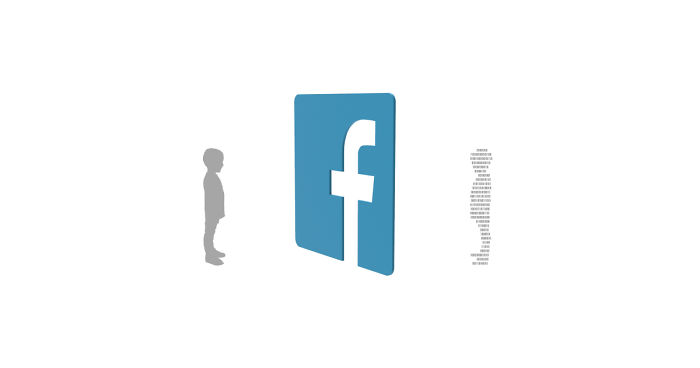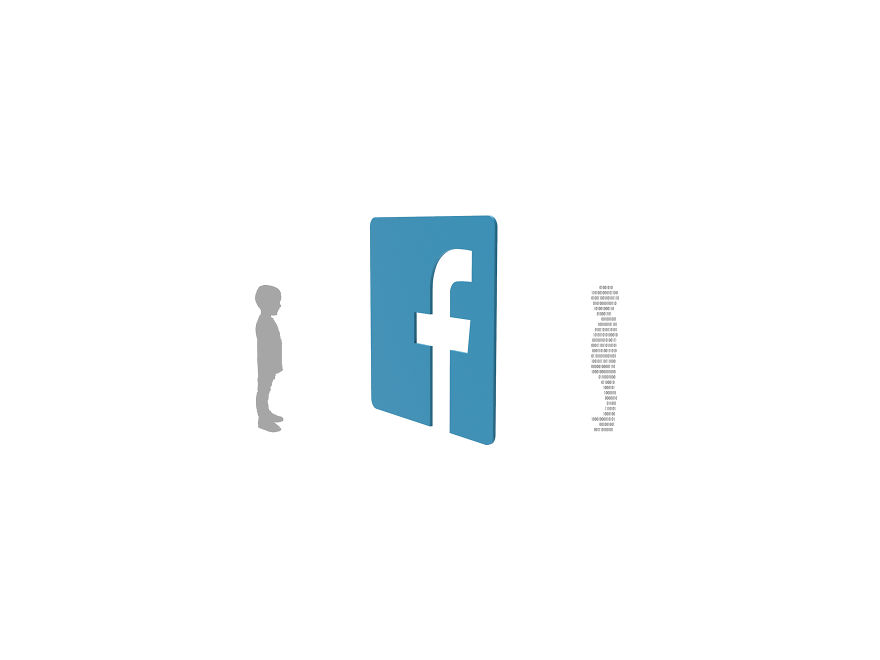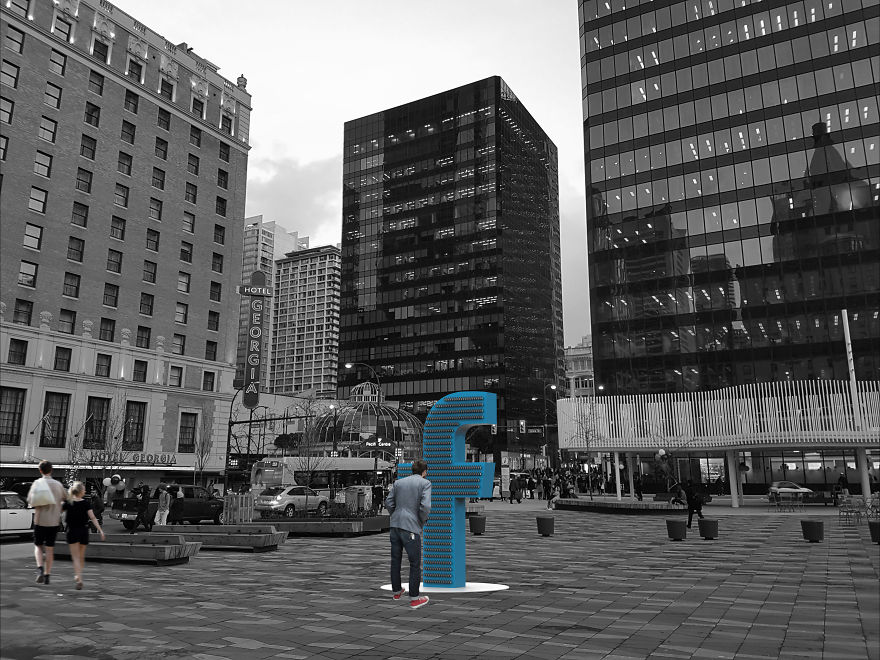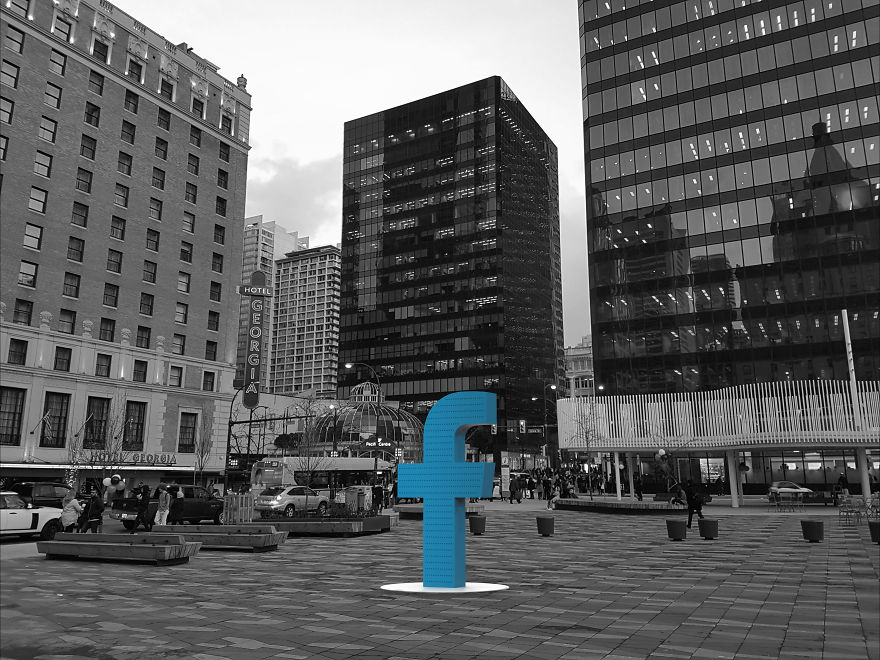It was the third hour when they crucified him. The written notice of the charge against him read: THE KING OF THE JEWS. They crucified two robbers with him, one on his right and one on his left. Those who passed by hurled insults at him, shaking their heads and saying, “So! You who are going to destroy the temple and build it in three days, come down from the cross and save yourself!” (Mark: 15:25-30)
Designer: Yongwook Seong
George Orwell’s big brother in 1984 is refashioned in the 21st century, but this time, it resurfaces in a form of cognitive capitalism. Our cognition and behaviour are being constantly recorded and surveilled on popular online platforms such as Google and Facebook. These cognitive inputs on these platforms are computerized as commodified data for the use of third parties while we remain unknown where these data are used.
Facebook users are currently reaching two billions, which is a remarkable figure, considering only half of the world’s population has access to the Internet. Facebook’s current market capitalization is about 519 billion US dollars. It is the 8th largest publicly traded company in the world with over 90 percent of its revenue coming from advertising (Constine, TechCrunch). Facebook, in this vein, is predominantly an advertising business corporation where its business interest lies in the accumulation of commodifiable data extracted from ‘Friends.’ Behind its mask of friend-making, it is arguable that Facebook is highly sophisticated algorithms programmed to maximize business interests. This is especially worrisome since its algorithms driven by the neo-liberalist business rationale can permeate through the psyche of two billion users and have a huge influence over our behaviour.
More info: cargocollective.com
Fig. 1: ‘Dividual Mirror’ – Is it really yourself?
In Postscript on the Societies of Control, Deuleze implicates that Foucaudian discipline, the control of the physical body, may have come to an end today. “The society of control” is no longer interested in the human body as a primary disciplinary object (Deuleze, 5). Deuleze argues that individuals become “dividual,” a numerical body that comprises data (Deuleze, 5).
“The society of control” regulates an individual’s codes that access to information. In other words, individuals are degraded to market data, banking data, biological data and etc. These data, in turn, can be converted for possible control and surveillance.
Fig. 2: ‘Like USB’ (each Like USB contains a Facebook user’s ‘private’ data and Facebook photos.)
The self on Facebook is segmented by gender, age, location, religion and etc. Each profile input is automatically categorized at the speed of light. These “dividual” data are then seamlessly synchronized with its algorithmic codes. In this sense, the Facebook self is a highly dividualized being, whose data are conveniently classified and managed for its internal and external use.
Fig. 3: 653 martyrs volunteer to be plugged in the Post-Facebook installation.
Van Dijck argues that there exists discrepancy between users and Facebook administrator (Dijck, 12). The administrator’s goal is to accumulate more data from users. The more data means the more relevant and accurate advertising it can provide to users and more information to share with third parties. However, users do not usually favour its exploitation of their information. Van Dijck states that “Facebook’s business model is most certainly a contentious balancing act between stimulating users’ activity and exploiting it; its success ultimately depends on customers’ willingness to contribute data and to allow maximum data mining (Dijck, 22).”
Revoy argues that Facebook “liquefies” our social relations by converting social relations into commodities (Revoy, 93). He describes that for social convenience, users give up “sovereignty” of their social activities, which are now exploited for “marketable data” (Revoy, 91). Friends on Facebook are no longer confined to a traditional definition of a friend, but the creation of its algorithm. Hence, the Facebook interface is intrinsically designed to render “friendshopping,” the consumerist mode of social relations (Revoy, 106). Van Dijk also points out that the unprecedented digitization takes place through Facebook. What were used to be exchanged and shared between friends and families in a private time and space are now massively converted into data on corporate domain (Dijck, 24).
Fig. 4: Crucifixion in the Post-Facebook era
Fig. 5: 653 martyrs hanging on Post-Facebook.
Fig. 6: ‘Death’ of 653 martyrs (Is this a signal for resurrection?)
At the Aixos event, Philadelphia, Facebook co-founder, Sean Parker said that “I don’t know if I really understood the consequences of what I was saying, because [of] the unintended consequences of a network when it grows to a billion or 2 billion people and … it literally changes your relationship with society, with each other,” Parker said… “God only knows what it’s doing to our children’s brains (Solon, the Guardian).”
Facebook deeply invokes the essential human desire of being liked and recognized, and creates the endless flow of “dividual” data uploaded by users. Its popularity-oriented feeding often leads Facebook users to popularist and acontextual communications. True and meaningful dialogues are inherently limited or may be essentially incompatible with its own platform.
Along with burgeoning Internet of Things, can individual users recover their data sovereignty from a centralized data platform? Or will we be able to witness the emergence of a platform self-governed by users in the future?
References:
Academic Journals:
Deleuze, Gilles. “Postscript on the Societies of Control.” October, vol. 59, 1992, pp. 3-7.
Revoy, Spencer. Control, Surveillance and Subjective Commodification on Facebook, ProQuest Dissertations Publishing, 2014.
Book:
Dijck, José v. The Culture of Connectivity: A Critical History of Social Media, Chapter 3: Facebook and the Imperative of Sharing. Oxford University Press, Oxford;New York, 2013.
Electronic Sources:
Constine, Josh. Facebook scores big in Q3 earnings: $7.01B revenue and 1.79B users. TechCrunch. 2 Nov.2016
Solon, Olivia. Ex-Facebook president Sean Parker: site made to exploit human ‘vulnerability.’ The Guardian. 9 Nov. 2017.
1Kviews
Share on FacebookFacebook likes can be an important factor for individuals likes in the USA only or brands looking to collaborate with influencers, as high engagement rates can indicate an engaged and receptive audience.
Facebook likes can be an important factor for individuals likes in the USA only or brands looking to collaborate with influencers, as high engagement rates can indicate an engaged and receptive audience.

 Dark Mode
Dark Mode 

 No fees, cancel anytime
No fees, cancel anytime 





















































10
2